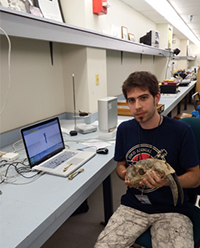 Alberto Valenciano. Departamento de Geología Sedimentaria y Cambio Medioambiental. Instituto de Geociencias (CSIC, UCM). Calle José Antonio Novais 12, 28040. Madrid, Spain and Departamento de Paleontología Universidad Complutense de Madrid (UCM), Facultad de Ciencias Geológicas UCM. Calle José Antonio Novais 12, 28040, Madrid, Spain. alb3rtovv@gmail.com
Alberto Valenciano. Departamento de Geología Sedimentaria y Cambio Medioambiental. Instituto de Geociencias (CSIC, UCM). Calle José Antonio Novais 12, 28040. Madrid, Spain and Departamento de Paleontología Universidad Complutense de Madrid (UCM), Facultad de Ciencias Geológicas UCM. Calle José Antonio Novais 12, 28040, Madrid, Spain. alb3rtovv@gmail.com
Alberto Valenciano is a PhD. granted candidate at Instituto de Geociencias and Universidad Complutense de Madrid. His research is focused on the extinct giant mustelids from the Neogene and Quaternary of Europe, Asia, Africa and North America (e.g. Ekorus, Enhydritherium, Enhydriodon, Eomellivora, Hoplictis, Megalictis, Oligobunis, Plesiogulo, Sivaonyx...). He is especially interested in comparative, biometric, morphological and three-dimensional studies of extinct large and giant musteloids (including mustelids, ailurids, procyonids and mephitids) to understand their paleobiology and their evolutive relationships. At the same time, He is studying some carnivorans (mustelids, mephitids and ursids) from the vertebrate site of Batallones (Bat-1 and Bat-3), late Miocene, Vallesian MN 10 (Torrejón de Velasco, Spain). Moreover He is also collaborating with several vertebrate paleontologist researchers studying small Neogene musteloids, bears and amphicyonids from Europe, North America, Turkey and Africa.

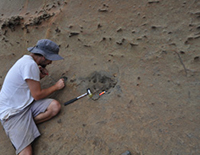 Juan Abella. Universidad Estatal Península de Santa Elena. Kilómetro 1,5 de la Vía Santa Elena- La Libertad. Edificio Instituto de Investigacion Científica y Desarrollo Tecnológico INCYT), Segundo Piso. 240210 La Libertad, Ecuador. jabella@upse.edu.ec and Institut Català de Paleontologia Miquel Crusafont, Universitat Autònoma de Barcelona. Edifici Institut de Ciència i Tecnologia Ambientals - Institut Català de Paleontologia (ICTA-ICP), Campus de la UAB, Carrer de les Columnes s/n, 08193 Cerdanyola del Vallès, 08193, Barcelona, Spain. juan.abella@icp.cat
Juan Abella. Universidad Estatal Península de Santa Elena. Kilómetro 1,5 de la Vía Santa Elena- La Libertad. Edificio Instituto de Investigacion Científica y Desarrollo Tecnológico INCYT), Segundo Piso. 240210 La Libertad, Ecuador. jabella@upse.edu.ec and Institut Català de Paleontologia Miquel Crusafont, Universitat Autònoma de Barcelona. Edifici Institut de Ciència i Tecnologia Ambientals - Institut Català de Paleontologia (ICTA-ICP), Campus de la UAB, Carrer de les Columnes s/n, 08193 Cerdanyola del Vallès, 08193, Barcelona, Spain. juan.abella@icp.cat
Juan Abella is a PhD, staff member of the Universidad Estatal Península de Santa Elena, Ecuador. Although his main research in palaeontology dealt with several groups of mammalian carnivorans, mainly the Arctoidea, and his PhD thesis was study of the fossil remains of the basal bear Indarctos arctoides from the Batallones-3 site. Recently, he is also carrying out a research project about the Cenozoic evolution of the Ecuadorian faunas, with emphasis in marine vertebrates. He is author of more than 20 works published in scientific journals and books and he has participated in more than 5 research projects.

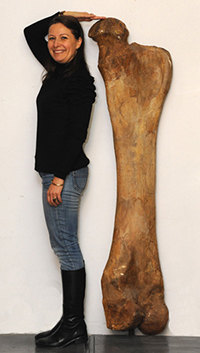 Ursula B. Göhlich. Naturhistorisches Museum Wien, Dept. Geology and Paleontology Burgring 7, 1010 Vienna, Austria. ursula.goehlich@nhm-wien.ac.at
Ursula B. Göhlich. Naturhistorisches Museum Wien, Dept. Geology and Paleontology Burgring 7, 1010 Vienna, Austria. ursula.goehlich@nhm-wien.ac.at
Dr. Ursula Göhlich is curator of vertebrate paleontology at the Natural History Museum of Vienna since 2007. She received her PhD in 1997 from the University of Munich (Germany) followed by several Postdoc projects e.g. at the University of Lyon (France) (as an Alexander-von-Humboldt fellow) and at the Natural History Museum of Los Angeles (USA). In 2011 she obtained her habilitation from the University of Munich, where she is an associated professor since then.
She is specialized on European Neogene proboscideans and birds and addresses taxonomy, biogeography, biostratigraphy, and paleoecology, but her research also covers other vertebrate groups and topics.

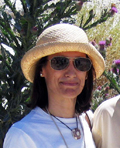 M. Ángeles Álvarez-Sierra. Departamento de Geología Sedimentaria y Cambio Medioambiental. Instituto de Geociencias (CSIC, UCM). Calle José Antonio Novais 12, 28040. Madrid, Spain and Departamento de Paleontología Universidad Complutense de Madrid (UCM), Facultad de Ciencias Geológicas UCM. Calle José Antonio Novais 12, 28040, Madrid, Spain. masierra@ucm.es
M. Ángeles Álvarez-Sierra. Departamento de Geología Sedimentaria y Cambio Medioambiental. Instituto de Geociencias (CSIC, UCM). Calle José Antonio Novais 12, 28040. Madrid, Spain and Departamento de Paleontología Universidad Complutense de Madrid (UCM), Facultad de Ciencias Geológicas UCM. Calle José Antonio Novais 12, 28040, Madrid, Spain. masierra@ucm.es
M. Ángeles Álvarez-Sierra is a professor of paleontology at the Universidad Complutense of Madrid, Spain. She is focused on European Cenozoic small mammals (mainly rodents) and concerned about paleobiology and biostratigraphy. She participates in excavations and studies of several fossil sites in Spain (Cuenca de El Ebro, Madrid -Batallones, Somosaguas-, Calatayud-Teruel, Loranca). She is author of more than 100 works published in scientific journals and books and she has participated in more than 25 research projects.

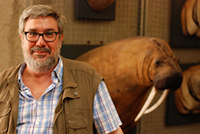 Jorge Morales. Departamento de Paleobiología. Museo Nacional de Ciencias Naturales-CSIC, Calle José Gutiérrez Abascal, 2, 28006, Madrid, Spain. mcnm166@mncn.csic.es
Jorge Morales. Departamento de Paleobiología. Museo Nacional de Ciencias Naturales-CSIC, Calle José Gutiérrez Abascal, 2, 28006, Madrid, Spain. mcnm166@mncn.csic.es
Jorge Morales is Research Professor at the National Museum of Natural Sciences of Madrid, CSIC, Spain. He focuses his research on ruminant and carnivoran systematics and evolution from Eurasia and Africa. He has been notably involved in field excavations in the Miocene of Spain and Africa. He leads the research project of late Miocene of Batallones fossil vertebrate sites (Madrid basin, Spain). These localities are yielding some of the most interesting, richest and best-preserved Neogene (late Miocene) vertebrate assemblages of the Iberian Peninsula.

